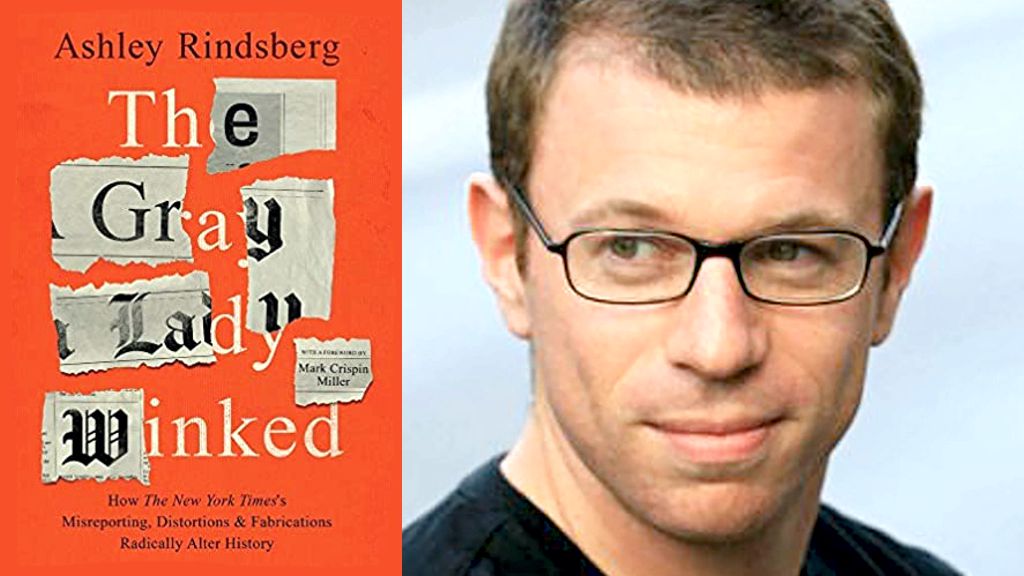The History of the New York Times’ Fake News Propaganda
“The New York Times is by far the most influential newspaper in the world and thus receives far too little journalistic scrutiny due to its power to affect careers. Any book that casts a critical eye on the Paper of Record’s history, as this book does, is performing a valuable service.” -Glenn Greenwald, Journalist & New York Times Bestselling Author
“In an account brimming with fascinating, if morbid, detail, Ashley Rindsberg rigorously exposes the dark side of the New York Times. For 99 years- since a 1922 description of Hitler as someone ‘actuated by lofty, unselfish patriotism’-it has labored under the shadow of its dynastic owners’ triad of problems: capitalist guilt, Jewish self-hatred, and an ambition for power, wealth, and status. The Times‘ importance means the family’s issues have done much damage.” -Daniel Pipes, Historian & President of Middle East Forum

Think a newspaper can’t be responsible for mass murder? Think again.
As flagship of the American news media, the New York Times is the world’s most powerful news outlet. With thousands of reporters covering events from all corners of the globe, the Times has the power to influence wars, foment revolution, shape economies and change the very nature of our culture. It doesn’t just cover the news: it creates it.
But the institution that is the New York Times is showing cracks. No longer the fact-stringing paper of record once known as the Gray Lady, the Times has become a political lightning rod that divides more often than it unites. It is frequently beset by scandal and has even emerged as a symbol of the political, cultural and social ills plaguing our society.
The Gray Lady Winked pulls back the curtain on this illustrious institution to reveal a quintessentially human organization where ideology, ego, power and politics compete with the more humble need to present the facts. In its 10 gripping chapters, The Gray Lady Winked offers readers an eye-opening, often shocking, look at the New York Times‘s greatest journalistic failures, so devastating they changed the course of history.
These are the stories that mattered most, including the Times‘s disastrous coverage of the:
Second World War – Holocaust – Rise of the Soviet Union – Cuban Revolution – Vietnam War – Second Palestinian Intifada – Atomic Bombing of Japan – Iraq War – Founding of America.
The result is an essential look at the tangled relationship between media, power and politics in a post-truth world told with novelistic flair to reveal a uniquely powerful institution’s tortured relationship with the truth.
Most importantly of all, The Gray Lady Winked presents a cautionary tale that shows what happens when the guardians of the truth abandon that sacred value in favor of self-interest and ideology-and what this means for our future as much as for our past.

Biography
Ashley Rindsberg is a novelist and essayist. Born in South Africa, Rindsberg immigrated to the US as a child. His family moved around the country until settling in San Diego.
After earning degrees in Philosophy and Science & Technology Studies at Cornell University, Rindsberg worked at prestigious digital NGO, Internet Archive, where he ran the Internet Bookmobile project. His work for the Archive took him to Egypt, where he installed the country’s first Internet Bookmobile at the Library of Alexandria.
In 2004, Rindsberg made a life changing decision to take a job as a deckhand on a Swedish sailing yacht. For three months, Rindsberg sailed with the boat’s skipper-owner through the Ionian and onto the Aegean, on a journey that eventually brought him to Tel Aviv.
Over the course of 13 years spent wandering Israel’s “unholy city,” Rindsberg encountered the beggars, dreamers, artists, musicians and madmen who would inspire his first collection of fiction, Tel Aviv Stories.
Rindsberg has contributed essays and journalism to a number of publications. He was managing editor of the short-lived but culturally influential English-language Israeli magazine, 18, and served as a founding associate editor of long-form Mideast policy and culture magazine, The Tower.








